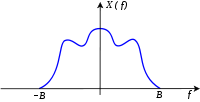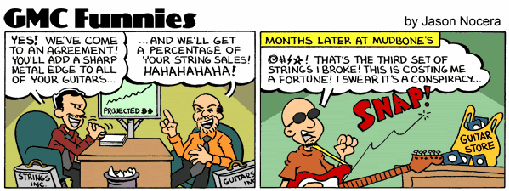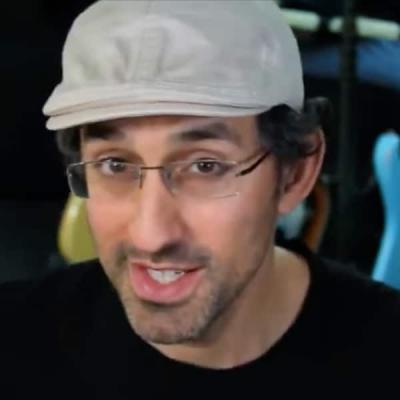Digital Is Digital, do you know someone who uses processors and still sounds "natural& |
|
|
|
|
|
| Aug 9 2011, 10:11 PM |
|
So, I was thinking.. During 80ties when processors and rack devices started to emerge, lots of players embraced them - and you can definitely hear that. Sound became thinner, everything sounding more or less processed.
How bout today? Do you know any awesome guitar player that sounds "natural", that is using digital gear? -------------------- - Ivan's Video Chat Lesson Notes HERE
- Check out my GMC Profile and Lessons - (Please subscribe to my) YouTube Official Channel - Let's be connected through ! Facebook! :) |
|
|
||
|
|
|
|
| Aug 9 2011, 11:35 PM |
|
I saw Steve Vai using TC electronics effects and sounds great... but talking about amps.. I can't name any player...
-------------------- My lessons
Do you need a Guitar Plan? Join Gab's Army Check my band:Cirse Check my soundcloud:Soundcloud Please subscribe to my:Youtube Channel |
|
|
||
|
|
|
|
| Aug 10 2011, 05:26 AM |
|
Malcolm Young of AC/DC used Guitar Rig to record his parts in this song. Sounds pretty good to me, digital or not I didn't know this.. awesome. -------------------- My lessons
Do you need a Guitar Plan? Join Gab's Army Check my band:Cirse Check my soundcloud:Soundcloud Please subscribe to my:Youtube Channel |
|
|
||
|
|
|
|
| Aug 10 2011, 08:53 AM |
|
Live sound is perhaps a little different to anything that is recorded, mixed and mastered for commercial release. Any commerical release is almost certain to have been through an analogue chain at some stage and that willl affect the sound quite significantly. Very few professional sound engineers rely on digital processing. At mastering, for instance, the majority of processing is done on hardware rather than on digital plug ins/emulations. Simple reason is that so far very few, if any, come close to acheiving the same sound as good hardware for lots of reasons. This includes vsts that emulate or model hardware. Digital effects/processing may be used in a studio by a guitar player but the extent to which that that is then affected/enhanced by the use of analogue outboard arguably is quite significant.
What works in digital imho are time and harmonising type effects. What is much better done in hardware tends to be dynamics, eq and distortion/saturation. -------------------- Get your music professionally mastered by anl AES registered Mastering Engineer. Contact me for Audio Mastering Services and Advice and visit our website www.miromastering.com
Be friends on facebook with us here. We use professional, mastering grade hardware in our mastering studo. Our hardware includes: Cranesong Avocet II Monitor Controller, Dangerous Music Liasion Insert Hardware Router, ATC SCM Pro Monitors, Lavry Black DA11, Prism Orpheus ADC/DAC, Gyratec Gyraf XIV Parallel Passive Mastering EQ, Great River MAQ 2NV Mastering EQ, Kush Clariphonic Parallel EQ Shelf, Maselec MLA-2 Mastering Compressor, API 2500 Mastering Compressor, Eventide Eclipse Reverb/Echo. |
|
|
||
|
|
|
|
| Aug 10 2011, 08:10 PM |
|
Digital is still digital!
Regarding ACDC, I don't believe they used guitar rig! Here is article about recording Black Ice btw, it's very interesting. Be sure to check out RCA BA6A compressors used for the album http://www.solodallas.net/superb-black-ice...by-mike-fraser/ -------------------- - Ivan's Video Chat Lesson Notes HERE
- Check out my GMC Profile and Lessons - (Please subscribe to my) YouTube Official Channel - Let's be connected through ! Facebook! :) |
|
|
||
|
|
|
|
|
Aug 11 2011, 01:34 AM
|
|
Digital is still digital! Regarding ACDC, I don't believe they used guitar rig! Here is article about recording Black Ice btw, it's very interesting. Be sure to check out RCA BA6A compressors used for the album http://www.solodallas.net/superb-black-ice...by-mike-fraser/ Digital is digital, but my Digitech RP 1000 gives me access to many different amps, effects, stompboxes, cabs etc that I otherwise would never have access to because of expense. Lots of bedroom musicians have made some great recordings on youtube thanks to some of these devices. Many guitarists use them on stage live at their gigs. The guitars on this video (link) were recorded using a Boss GT 10 floor processor. https://www.youtube.com/watch?v=qWYiemdJ5mg I agree it may not be as nice as John Petrucci's stage rig, but we do the best we can with our resources, and sometimes these processors give us alot of value for our limited funds. -------------------- Ibanez RG470AH
Digitech RP1000 Tech21 'Sound Engine' 60 1x12 cab |
|
|
||
|
|
|
|
| Aug 14 2011, 09:20 PM |
|
With converters, specially low quality ones that they usually put in ALL processors, the difference is huge even on bypass. It removes all the nice top end sizzle, and it disables the possibility for a good quality feedback. Digital is more practical tho..
-------------------- - Ivan's Video Chat Lesson Notes HERE
- Check out my GMC Profile and Lessons - (Please subscribe to my) YouTube Official Channel - Let's be connected through ! Facebook! :) |
|
|
||
|
|
|
|
| Aug 14 2011, 11:33 PM |
|
I've seen Dethklok and Trans-Siberian Orchestra and both of them have a guitarist that use a Pod XT.
Dethklok ran it into a Krank amp when I seen them live so it still had some warmth to it but when they put it into leads and a hi-gain distortion it got less warm and went more towards a sterile sound. TSO I believe is ran straight into a mixer, honestly I can't tell, the quality of the show itself is about the same as seeing some one lip sync a cd, its spot on. I have had digital all my life, old school DOD, Zoom 505-II, Pod XT, Boss GT-10, Pod HD500. They have always done what I needed for my budget. Look at all the instructors that use guitar rig for lessons, they sound amazing. I think that there is always a place for it somewhere. You can always add cab sims and such that help make it more realistic and gives more depth to the sound. You can sit on youtube listening to fearedse test amps, stomps, and multis. Digital sound Axe FX to my ears is the closest sound to the real thing. With having the Pod HD500 myself and using the rectifier tone it got the job done. But truthfully it has nothing on the amp. -------------------- Guitars:
Ibanez S770PB (Natural Flat) , Ibanez XPT700 (Chameleon) , Sterling J Richardson Signature , Squire IV Jazz Bass (Sunburst) Gear: Neural DSP Plugins My YouTube Page. |
|
|
||
|
|
|
|
| Aug 15 2011, 06:48 AM |
|
...... What works in digital imho are time and harmonising type effects. What is much better done in hardware tends to be dynamics, eq and distortion/saturation. Tony is spot on per usual during production and post. That stuff ain't cheap. You find both in use at all ends of the spectrum of course, but high dollar shops, studios, bands, do tend to have some actual gear involved in the signal chain to "warm up" the signal. For example a guitarist might do his tracks at home through this AXE FX, even for a big band, but his track might get put through and old analogue console/preamps/compressors, during mix down. Then more live circuits during Mastering. The big gap between Digital and Analogue, is (IMHO, and mostly) about sampling (believe it or not) the stuff we can't hear impacts the stuff we can hear. Things like Harmonic Distortion, even at inaudble frequencies, create resonance/harmonics/noise/warmth, in the frequencies our ears actually pick up. So (HERE IS WHERE IT GETS TECHNICAL) if we are using the Nyquist theorem, and our max frequency is half our sampling rate, and we work at 48k, then 24k is our highest tone. We can't hear much beyond 18 or 20k, but again it's not the frequencies we can hear that are the point here. It's about the stuff that gets chopped off during sampling/quantization.  http://en.wikipedia.org/wiki/Nyquist%E2%80...ampling_theorem So the new trend in digital gear is (wait for it) Hyper Oversampling! This way we start to include the bits we can't hear in our processing. So technology is on the right track. But until we can sample in crazy numbers like, oh, 968k+ (Which is science fiction at this point) we can't sample adequate information to trick the trained ear. GIven the collapse of CPU/Ram/storage price curves over the last decade (if cars kept pace we'd have cars that could fly and cost pennies) and the development of software on a tear, I think we are going to get close than we have ever been very very soon, in terms of making a sampled, digital signal have the warmth and love/heat/magic that pure analogue signal chain has now. |
|
|
||
|
|
|
|
| Aug 15 2011, 02:27 PM |
|
Sampling rate of a 96KHz is already high enough, but the problem lies in the usage of low pass antialiasing filters. On high end converters, filters are sharp and precise enough even on high sampling rates, and this is what gives quality to those units.
-------------------- - Ivan's Video Chat Lesson Notes HERE
- Check out my GMC Profile and Lessons - (Please subscribe to my) YouTube Official Channel - Let's be connected through ! Facebook! :) |
|
|
||
|
|
|
|
| Aug 17 2011, 06:35 PM |
|
... The big gap between Digital and Analogue, is (IMHO, and mostly) about sampling (believe it or not) the stuff we can't hear impacts the stuff we can hear. Things like Harmonic Distortion, even at inaudble frequencies, create resonance/harmonics/noise/warmth, in the frequencies our ears actually pick up. So (HERE IS WHERE IT GETS TECHNICAL) if we are using the Nyquist theorem, and our max frequency is half our sampling rate, and we work at 48k, then 24k is our highest tone. We can't hear much beyond 18 or 20k, but again it's not the frequencies we can hear that are the point here. It's about the stuff that gets chopped off during sampling/quantization.  http://en.wikipedia.org/wiki/Nyquist%E2%80...ampling_theorem So the new trend in digital gear is (wait for it) Hyper Oversampling! This way we start to include the bits we can't hear in our processing. So technology is on the right track. But until we can sample in crazy numbers like, oh, 968k+ (Which is science fiction at this point) we can't sample adequate information to trick the trained ear. GIven the collapse of CPU/Ram/storage price curves over the last decade (if cars kept pace we'd have cars that could fly and cost pennies) and the development of software on a tear, I think we are going to get close than we have ever been very very soon, in terms of making a sampled, digital signal have the warmth and love/heat/magic that pure analogue signal chain has now. Yes to some extent. The Nyquist point at 24kHz when the sampling is at 48 is above our audible range but it can still be an issue due to aliasing and folding back of that down in to the upper end of our audible range. To some extent though many of the non high end DACs aren't good enough though to seriously reproduce much above 16-18kHz with any sense of accuracy and without the low level dropping down to the noise floor or below. So the folding back, whilst there, may generally go unnoticed. At the present moment in time Ivan's right: Sampling rate of a 96KHz is already high enough, but the problem lies in the usage of low pass antialiasing filters. On high end converters, filters are sharp and precise enough even on high sampling rates, and this is what gives quality to those units. lbsolutely Ivan abeit that there is another reason why 96kHz is more than sufficient. Quite simply above 96kHz you generate a huge amount of data and that can cause problems as the hardware struggles to process it. At the moment you'd be hard pushed to find any professional mastering studio that routinely runs at anything other than 44.1/48kHz and 24 bit. That's even though we use high end convertors at least in part for the reasons Ivan describes. By high end convertors I really mean ones from likes of Lavry, Cranesong, Forsell, Prism etc than the prosumer stuff and below. Mudbone - yes mp3s are (over) compressed and the compression is part of the problem. That compression is made even worse if apoorly encoded mp3 is then processed further for, for example, radio or Youtube broadcast. You then run in to an affect called cascading where the end result is a very thin and brittle audio. Another (related) issue is that the encoding to mp3 also introduces other issues related to innaccurate internal summing when the mp3 is transcoded that can drive transients in to clipping. These intersample overs can't be properly interpreted by the DAC and ends up being reproduced as high frequency distortion and or drop out. As a mastering engineer we have to pay attention to issues like this and account for whether the final product is likely to be digital distribution as mp3s or hard copy CDs and respond accordingly. That's part of the quality assurance that we provide. What sadly is more often the case nowadays is that a pro ME isn't used. The person who does the work either is unaware of these issues, doesn't understand the science, doesn't have the correct equipment or doesn't care enough to deal with it. You then end up with the nasty, brittle mp3s that you hear so much everywhere. Sad really,musicians spend years learning to play, take time to write their music and practice it. They go in to a studio and record it but for the sake of a few dollars they don't have it mastered professionally and end up with... -------------------- Get your music professionally mastered by anl AES registered Mastering Engineer. Contact me for Audio Mastering Services and Advice and visit our website www.miromastering.com
Be friends on facebook with us here. We use professional, mastering grade hardware in our mastering studo. Our hardware includes: Cranesong Avocet II Monitor Controller, Dangerous Music Liasion Insert Hardware Router, ATC SCM Pro Monitors, Lavry Black DA11, Prism Orpheus ADC/DAC, Gyratec Gyraf XIV Parallel Passive Mastering EQ, Great River MAQ 2NV Mastering EQ, Kush Clariphonic Parallel EQ Shelf, Maselec MLA-2 Mastering Compressor, API 2500 Mastering Compressor, Eventide Eclipse Reverb/Echo. |
|
|
||
|
|
|
|
| Aug 17 2011, 09:04 PM |
|
Tony is correct. Theoretically one can digitize a signal and lose nothing, but putting theory into practice is another thing.
This goes back to when I studied computer science, this is the math that it primarily is built on. I had to compete with Chinese and Indian students in this class, meaning I only got though by visiting the professor during office hours on a regular basis, and prostrating myself on the ground and worshiping him, and begging for mercy. If you want to see the gory details of what type of course you NEVER want to take competing for grades with nearly all Indian and Chinese students, here you go. http://en.wikipedia.org/wiki/Fourier_transform Yes to some extent. The Nyquist point at 24kHz when the sampling is at 48 is above our audible range but it can still be an issue due to aliasing and folding back of that down in to the upper end of our audible range. To some extent though many of the non high end DACs aren't good enough though to seriously reproduce much above 16-18kHz with any sense of accuracy and without the low level dropping down to the noise floor or below. So the folding back, whilst there, may generally go unnoticed. At the present moment in time Ivan's right: lbsolutely Ivan abeit that there is another reason why 96kHz is more than sufficient. Quite simply above 96kHz you generate a huge amount of data and that can cause problems as the hardware struggles to process it. At the moment you'd be hard pushed to find any professional mastering studio that routinely runs at anything other than 44.1/48kHz and 24 bit. That's even though we use high end convertors at least in part for the reasons Ivan describes. By high end convertors I really mean ones from likes of Lavry, Cranesong, Forsell, Prism etc than the prosumer stuff and below. Mudbone - yes mp3s are (over) compressed and the compression is part of the problem. That compression is made even worse if apoorly encoded mp3 is then processed further for, for example, radio or Youtube broadcast. You then run in to an affect called cascading where the end result is a very thin and brittle audio. Another (related) issue is that the encoding to mp3 also introduces other issues related to innaccurate internal summing when the mp3 is transcoded that can drive transients in to clipping. These intersample overs can't be properly interpreted by the DAC and ends up being reproduced as high frequency distortion and or drop out. As a mastering engineer we have to pay attention to issues like this and account for whether the final product is likely to be digital distribution as mp3s or hard copy CDs and respond accordingly. That's part of the quality assurance that we provide. What sadly is more often the case nowadays is that a pro ME isn't used. The person who does the work either is unaware of these issues, doesn't understand the science, doesn't have the correct equipment or doesn't care enough to deal with it. You then end up with the nasty, brittle mp3s that you hear so much everywhere. Sad really,musicians spend years learning to play, take time to write their music and practice it. They go in to a studio and record it but for the sake of a few dollars they don't have it mastered professionally and end up with... |
|
|
||
|
|
|
|
| Aug 17 2011, 09:34 PM |
|
Sampling rate of a 96KHz is already high enough, but the problem lies in the usage of low pass antialiasing filters. On high end converters, filters are sharp and precise enough even on high sampling rates, and this is what gives quality to those units. 96k is "enough" for decent digital recordings sure We will need to see crazy high sample rates and over sampling, with better aliasing, bit depth etc. in order to get our digital systems to have the "Analogue Warmth" that so many of us try to put back in our signal path with plugins, 2 track tape, running through an analogue board etc. Then better DAC, etc. FKALICH: (Hardware limitations) This just seems impossible now. In five years it won't be. Moore's Law of MicroProcessor advancement marches on. Hardware gets fasters, bus width gets bigger, hard drives get larger, etc. It's just a matter of time. We will wonder how we ever got by with these low sample rates. I remember when 44.1 was "Enough" for most folks and 48k was high end. Now it's 96. Give it a few years. Here is a abstract to an article talking about the effect I'm on about here. It's called the "Hypersonic Effect". Essentially, encoding and reproducing sounds well beyond the audible limit of most hardware are pleasing to the ear much like a real instrument. It's still a new area of research in the Audio Engineering Society, even though the initial research goes back more than 10 years. This is from the JOURNAL OF NEUROPHYSIOLOGY http://jn.physiology.org/content/83/6/3548.abstract This post has been edited by Todd Simpson: Aug 17 2011, 10:33 PM |
|
|
||
1 User(s) are reading this topic (1 Guests and 0 Anonymous Users)
0 Members:





































